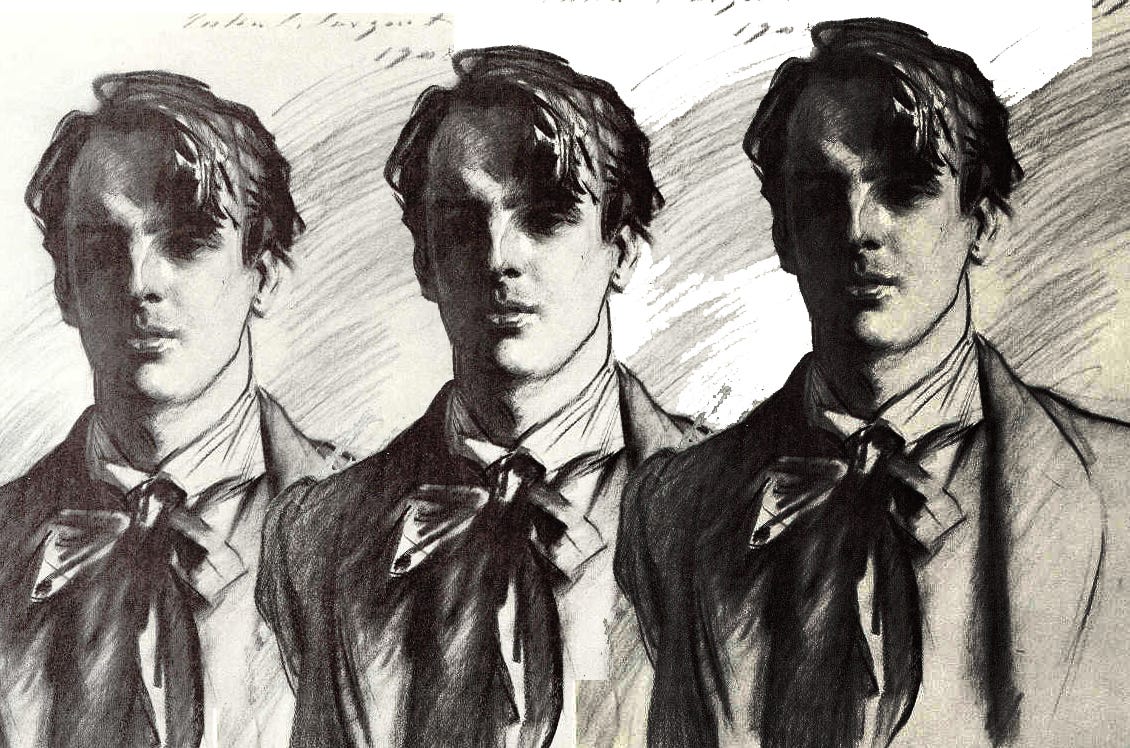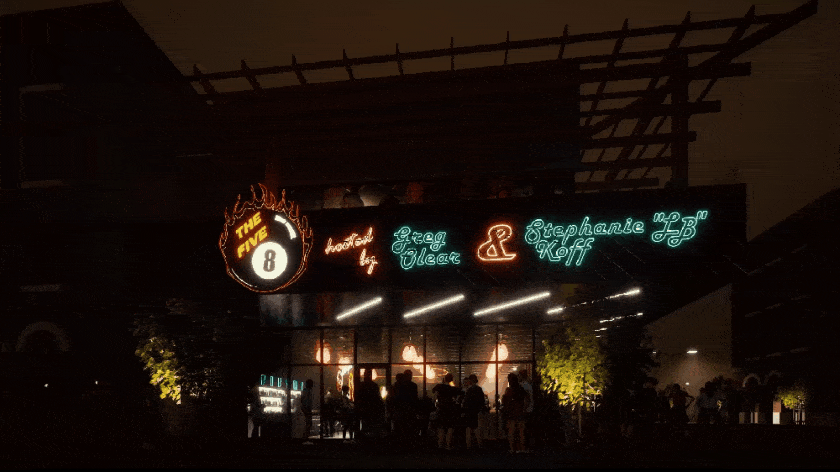Dear Reader,
The title for my book, Rough Beast—which, incidentally, I’ve discounted until Election Day—is lifted from the William Butler Yeats poem “The Second Coming.” His apocalyptic lines feel more and more relevant with each passing day: the gyre keeps widening, things continue to fall apart, and the best of us, lacking all conviction, hope against hope that the center will hold.
“The Second Coming” was written in 1920. Yeats, then just a few years older than I am right now, may have been thinking about the Great War of 1914-18, or the Spanish flu pandemic of 1919, or, more likely, the partition of Ireland that passed Parliament that year and would cleave the Emerald Isle by the end of 1922. In the land of his birth, things quite literally fell apart. But like all great poetry, “The Second Coming” is timeless.
That poem appeared in a 1920 anthology, Michael Robartes and the Dancer. While flipping through the other offerings in that collection, I came upon a 12-line poem I’d never read before, “The Leaders of the Crowd,” that feels just as prescient as “The Second Coming”—and seems to have been written specially for our homegrown Leader, the Rough Beast of Flushing. (The title, admittedly, is meh. Yeats should have called it “Demagogues.”) It goes like this:
They must to keep their certainty accuse
All that are different of a base intent;
Pull down established honour; hawk for news
Whatever their loose fantasy invent
And murmur it with bated breath, as though
The abounding gutter had been Helicon
Or calumny a song. How can they know
Truth flourishes where the student’s lamp has shone,
And there alone, that have no Solitude?
So the crowd come they care not what may come.
They have loud music, hope every day renewed
And heartier loves; that lamp is from the tomb.
This one has a lot of inverted phrasings that make it hard to follow in some places. I was taught that, when analyzing poetry, pay attention to the grammar. Move phrases and clauses around to make it easier to understand. Diagram the sentences. So here goes:
They must to keep their certainty accuse
All that are different of a base intent;
In order to preserve the illusion of power, they have to accuse “all that are different”—migrants, trans kids, Haitians in Ohio, Taylor Swift—of having ill intentions. Or, as the Rough Beast might say, of being “nasty.”
Pull down established honour;
In a word, desecrate. Desecration is the Rough Beast’s greatest skill. He likes soldiers who don’t get captured. To him, veterans and casualties of war are suckers and losers. His first wife is buried in a hole on his golf course. He’s selling his own Bibles! And so on.
hawk for news
Whatever their loose fantasy invent
And murmur it with bated breath, as though
The abounding gutter had been Helicon
Or calumny a song.
Make stuff up, concoct wild stories, generate suspense, spread lies, slander, generate fake news. And relate these “loose fantasies” with the utmost solemnity, to pass them off as real.
Helicon is the mountain in ancient Greece where the Muses were born—the birthplace of poetry. Calumny is the Shakespearean word for defamation. What the Leader of the Crowd does is drag down everything that is beautiful and true into the mud—the “abounding gutter.” Thus Kid Rock is equivalent to Bruce Springsteen, an NFT of the Leader as an astronaut is akin to a Vermeer or a Degas, an AP photo of him with blood on his ear is the same as an ikon of the Savior bleeding from the Crown of Thorns, and the Rough Beast is Jesus Christ Himself.
The phrases of the next part of the poem are all over the place:
How can they know
Truth flourishes where the student’s lamp has shone,
And there alone, that have no Solitude?
In plainer English: How can we expect the Leaders of the Crowd, who are never by themselves, who are afraid of being alone, to understand that the only way to realize Truth—the grand, capital-T Truth—is through quiet contemplation? No solitude, no enlightenment. Here the “student’s lamp” is the light of learning: that which the Rough Beast and his minions seek to extinguish, because knowledge is power.
So the crowd come they care not what may come.
As long as the fawning MAGA turn up at the rallies, the Rough Beast doesn’t give a shit what happens to them, or to the country. All that matters is the adulation.
They have loud music, hope every day renewed
And heartier loves;
The Leader feeds on the worshipful energy of the Crowd. It renews him, restores him. And if he spends 45 minutes playing “YMCA” through the loudspeakers and awkwardly dancing while soul-sucking like the energy vampire he is, so much the better. Because…
that lamp is from the tomb.
He will never learn. He is incapable of introspection, and thus incapable of learning. As for the Crowd? It may be that the death of the Leader will snap them out of it. Perhaps those who survive the Rough Beast’s passing will see the light (of the lamp from the tomb). Until that time, nothing about the dynamic will change. The Leader and the Crowd are wedded, and ‘til death will never part.
To be fair, there are other ways to read the poem. Yeats, a Protestant, might have had the Roman Catholic Church in mind here, where the Leader is the Pope, and the lamp from the tomb is the actual teaching of Jesus. Centuries of European holy war demonstrates that each side, Catholic and Protestant both, invested ample energy in accusing the other of “base intent.” Even so, the accuracy of Yeats’ description of a MAGA rally, many decades before the factories in Zhejiang began mass-producing red hats, is uncanny.
With just two weeks to go until Election Day, the Rough Beast cowers in his cave like a wounded animal. Even if he wins, he is unlikely to hold office for long. He is an aged creature in rapid decline. Thus what began as a choice between the two oldest men to ever seek the presidency is now a battle between the VPs: one who turns 60 today, the other just 40.
Yeats was right about that, too. This is no country for old men.
ICYMI
Excellent show on Friday. Our guest was Nadine Smith of Equality Florida:
This is our response to voters who claim they don’t know enough about Kamala Harris—that the sitting Vice President, a former Senator and Attorney General of the largest state in the country, is somehow a big mystery:
Rough Beast, as mentioned, is available for just $9.99 on Amazon between now and Election Day. This is the review from Chronogram magazine:
And if you’re in the city in November, please come join me, Stephanie Koff, and our surprise special guest at KGB the Sunday after the election, at our Five 8 live event:
Photo credit: Drawing of a young Yeats by John Singer Sargeant, 1908.







Excellent analysis, Greg. For me, this poem is a reaction to WWI, the ‘war to end all wars’, a horrific, bloody cataclysm.
My grand uncle Geoffrey was killed by the Germans at Flanders Field at the age of 19, and is buried at Marfaux British Cemetery nearby. This November 11, please keep a moment of silence for the millions who died in that war. We now carry the torch of freedom, and we must prevail.
The final stanza of “In Flanders Fields“ by John McCrae:
Take up our quarrel with the foe:
To you from failing hands we throw
The torch; be yours to hold it high.
If ye break faith with us who die
We shall not sleep, though poppies grow
In Flanders fields.
Thank you for your analysis. It's a pep talk, if you need to know. And I appreciate it.